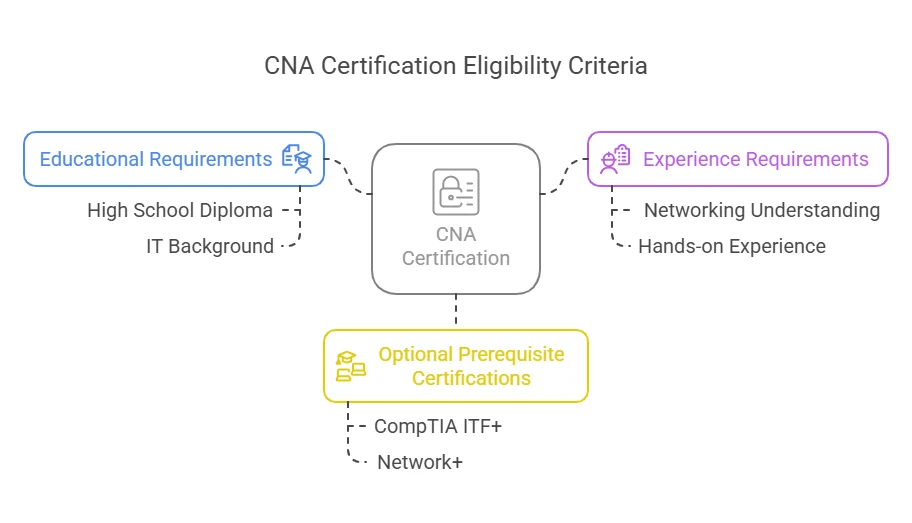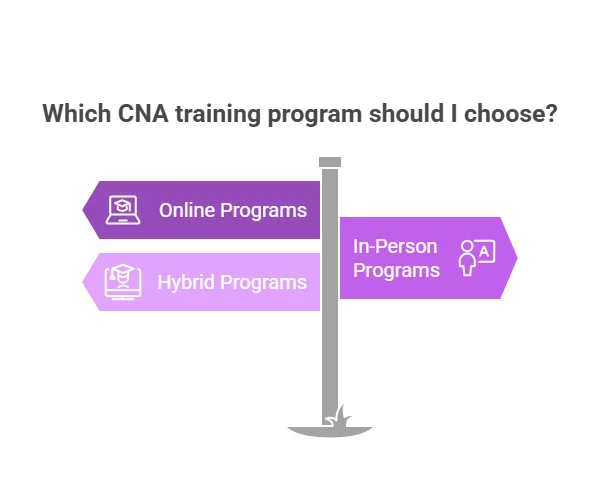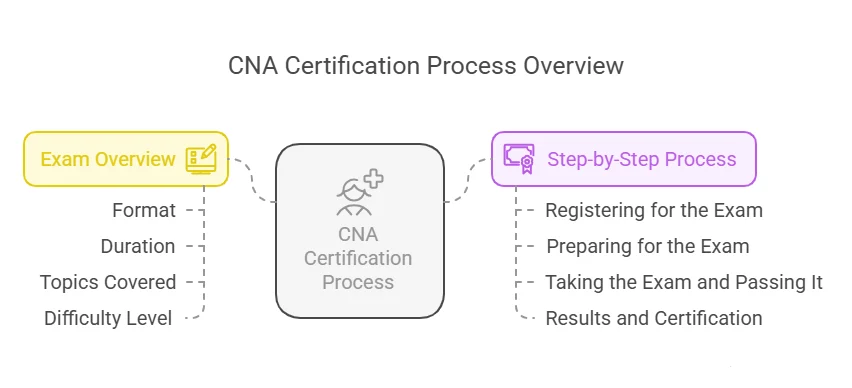In today’s digital age, cybersecurity is a rapidly growing field that requires trained professionals to protect sensitive data, networks, and systems from potential threats. For those interested in entering the cybersecurity field, the Certified Network Associate (CNA) certification is a valuable step in your career journey. This certification provides the foundational skills necessary for working in the realm of network security and is highly regarded within the industry.
This guide will take you through everything you need to know about obtaining CNA certification in cybersecurity, including eligibility criteria, training options, exam details, and more.
Introduction to CNA Certification
Certified Network Associate (CNA) certification is a widely recognized credential in the information technology and cybersecurity industry. It is designed to provide a deep understanding of network security, troubleshooting, and system administration, which are critical components of protecting digital infrastructure. While CNA certification is valuable on its own, it can also serve as a stepping stone for more advanced certifications, such as Cisco’s Certified Network Professional (CCNP) or Certified Information Systems Security Professional (CISSP).
In cybersecurity, the CNA credential equips professionals with the knowledge needed to manage and safeguard the networks that support critical business operations, making it essential for those looking to build a career in the ever-evolving field of cybersecurity.
Related Blog: Is CNA Certification Worth It for Cyber Security Careers?
Eligibility Criteria
Before pursuing CNA certification in cybersecurity, it’s essential to ensure that you meet the basic eligibility requirements. Generally, there are no strict prerequisites in terms of formal education for CNA certification. However, here are some things to consider:
- Educational Requirements: Most candidates are expected to have at least a high school diploma or equivalent. Some programs may require a background in IT, computer science, or a related field, although this is not always mandatory.
- Experience Requirements: While there is no strict experience requirement for CNA certification, having a basic understanding of networking, computers, and operating systems will significantly benefit candidates. It is highly recommended to have some hands-on experience with networking tools or working in a tech-related role.
- Optional Prerequisite Certifications: Some candidates opt to pursue foundational certifications, such as CompTIA’s IT Fundamentals (ITF+) or Network+ certifications, before applying for CNA certification. These certifications can provide a solid grounding in the basics of networking, making the CNA exam more manageable.

Choosing a Training Program
There are several ways to prepare for CNA certification, and selecting the right training program is a key decision in the process. Here are some options:
- Online Programs: Many institutions offer CNA certification courses online, allowing you to study at your own pace. These programs are flexible and convenient, making them ideal for individuals with busy schedules or those who prefer remote learning.
- In-Person Programs: Traditional classroom training is another option for candidates. In-person classes may provide more direct interaction with instructors and peers, which some candidates find helpful for understanding complex topics.
- Hybrid Programs: Hybrid programs combine both online and in-person training. These programs offer the flexibility of online learning while also providing the benefits of in-person interaction for practical experience and networking opportunities.
When choosing a program, be sure to check the course content to ensure it aligns with the most up-to-date industry standards and CNA exam objectives. Look for programs accredited by recognized organizations, and consider factors such as course duration, fees, and reviews from previous students.

Exam Overview
The CNA certification exam assesses your knowledge and understanding of networking and cybersecurity concepts. The exam is structured as follows:
- Format: The exam typically includes multiple-choice questions, performance-based simulations, and case study questions.
- Duration: The exam usually lasts between 90 to 120 minutes, depending on the certification provider.
- Topics Covered: The CNA exam tests a range of topics related to networking and cybersecurity, including:
- Network security fundamentals
- Routing and switching
- Cybersecurity protocols
- Wireless networking
- Network troubleshooting techniques
- Cybersecurity threats and mitigation strategies
- Difficulty Level: While the exam is not considered overly difficult, it requires a solid understanding of networking concepts and practical application in a cybersecurity environment.
- Step-by-Step Process
- Here’s a detailed step-by-step guide to obtaining your CNA certification in cybersecurity:
Registering for the Exam:
-
- To begin, you’ll need to select a certification body and register for the exam. Popular certification bodies include Cisco, CompTIA, and other accredited institutions.
- Create an account on their website and follow their registration process to schedule your exam.
Preparing for the Exam:
-
- Study Materials: Most CNA programs provide study guides and materials designed to help you prepare for the exam. These may include textbooks, online resources, and practice questions. Be sure to review the exam syllabus carefully.
- Practice Tests: Many candidates find taking practice exams incredibly helpful. These tests simulate the actual exam environment and provide insights into the types of questions you’ll encounter.
- Study Groups: Consider joining online study groups or forums where you can discuss topics with other aspiring candidates. Collaborative learning can help you understand complex concepts.
Taking the Exam and Passing It:
-
- On exam day, ensure you arrive early and bring the necessary identification. Most exams are administered at testing centers or through online proctoring services.
- During the exam, focus on answering each question carefully. Since the exam is timed, manage your time wisely.
- Results and Certification:
- Once you pass the exam, you’ll receive your CNA certification. Depending on the provider, the results are typically delivered within a few days.
Related Blog: Top Study Materials and Tips for Passing the CNA Cyber Security Certification Exam

Cost Breakdown
The cost of CNA certification varies depending on the certification body, training program, and exam format. Here’s a general cost breakdown:
- Training Costs: Online programs typically range from $500 to $3,000, depending on the institution and program length. In-person or hybrid programs may cost more, especially if they include hands-on lab training.
- Exam Fees: The CNA exam fee ranges from $100 to $300. Some institutions offer discounted exam fees if you complete a bundled training package.
- Additional Costs: Be sure to consider the cost of study materials, practice exams, and any renewal fees for the certification.
Renewal Process
CNA certifications typically require renewal every few years to ensure that professionals stay updated on the latest cybersecurity trends and techniques. The renewal process generally involves:
- Continuing Education (CE): Many CNA certifications require candidates to complete a set number of continuing education hours to maintain their certification. This can be achieved through courses, workshops, or conferences.
- Recertification Exam: In some cases, a recertification exam may be required. This ensures that certified professionals remain current with industry standards.
The renewal period may vary depending on the certification provider, so be sure to check their requirements.
Related Blog: CNA Certification vs. CISSP: Which Cyber Security Certification is Right for You?
Conclusion
Becoming CNA-certified in cybersecurity is an essential step in launching a rewarding career in this growing field. Whether you’re just starting or seeking to advance your career, this certification will help you gain the foundational knowledge and skills needed to succeed in the world of cybersecurity.
Remember, the process of becoming CNA certified is straightforward and rewarding. Take the first step today by researching training programs, preparing for the exam, and committing to a path of continuous learning. By earning your CNA certification in cybersecurity, you’re investing in your future and helping protect the digital world we all rely on.
Start your journey toward certification with the support and resources offered by ACSMI—your trusted partner in professional development and certification excellence.
FAQs
- What is CNA certification, and why is it important in cybersecurity?
- CNA certification is a foundational credential that verifies your ability to handle networking and cybersecurity tasks, such as securing networks and troubleshooting issues.
- Do I need prior experience to take the CNA exam?
- While prior experience is not required, a basic understanding of networking and IT concepts is recommended.
- How long does it take to earn CNA certification?
- The time it takes to earn CNA certification depends on your study schedule and preparation, but most candidates complete their training within 6 months to a year.
- How much does CNA certification cost?
- The cost for CNA certification varies, with training programs ranging from $500 to $3,000 and exam fees typically between $100 and $300.

Leave a Reply